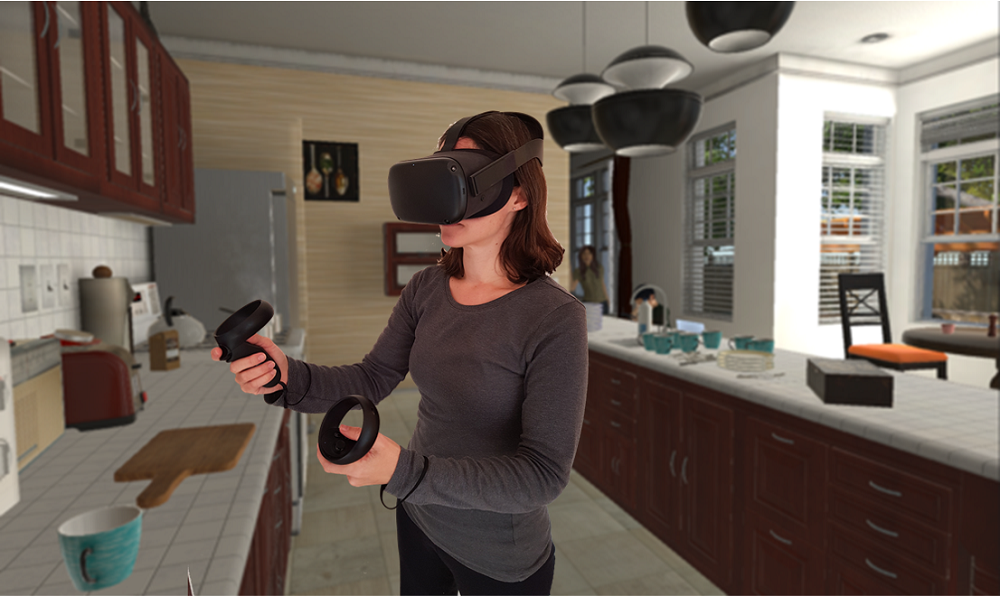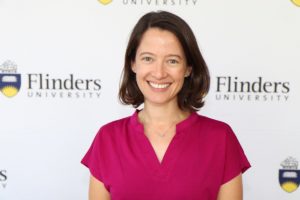
A virtual reality kitchen presents a unique rehabilitation tool, so we spoke with Associate Professor Belinda Lange about her technology-based research to train everyday life skills in people with brain injuries.
What is your role and what does your work focus on?
My research focuses on understanding how people use digital technologies in clinical, community and educational settings. I’m the Technology Theme Lead in the Caring Futures Institute and I teach into the Master of Physiotherapy, Bachelor of Health Sciences and Honours in Health Sciences programs. I also serve as Deputy Chair of the Southern Adelaide Clinical Human Research Ethics Committee and sit on the Flinders Human Research Ethics Committee.
I work closely with clinicians and different client populations to look at how digital technologies – such as mobile apps, virtual reality systems and video games – can be used to support care and increase participation. I work with different teams of researchers and interview people about their experiences, or invite people to try new technologies and share their thoughts about how it could be modified to meet their needs.
I’ve recently worked with industry partners Katana Simulations Pty Ltd and Brain Injury SA, with funding from Lifetime Support Authority, to evaluate a virtual reality kitchen scenario to train everyday life skills in individuals with brain injuries (it was covered in a recent report on ABC Radio).
In my role in the Caring Futures Institute, my goal is to support and build capacity for our members to undertake high-quality research evaluating or using digital technologies. Building capacity of our researchers and future health care professionals to use digital technologies to support care is extremely important, especially as COVID-19 has changed the way we live, work, play and care.
What journey brought you to this point in your career?
My PhD looked at the use of virtual reality for pain distraction during medical procedures. I found this topic really interesting and, at the time, there were not many people in Australia using virtual reality in the health care setting. After I finished my PhD, I was awarded an International Postdoctoral Scholarship that provided me with the opportunity to move to Los Angeles to work at the Institute for Creative Technologies at the University of Southern California with one of the pioneers of clinical virtual reality, Skip Rizzo.

The Institute for Creative Technologies is a unique collaboration between academia, the military, and the entertainment industry. I contributed to a range of projects in interdisciplinary teams that leveraged mobile, video game, virtual reality and virtual human technologies to support training, rehabilitation and wellbeing for military and civilian populations.
What started as a one-year postdoc led to an eight-year tenure, eventually taking on the role leading the Motor Rehab Lab within the Medical Virtual Reality Group. During this time, had the opportunity to lead and work within interdisciplinary teams on collaborative co-design projects using technologies in innovative ways.
This experience taught me a valuable lesson about language and communication and ensuring that all team members, regardless of their background or field, have a shared understanding of the terms we use group. I also had the opportunity to travel around the USA and internationally to speak at conferences and build connections with researchers across a range of fields – something I feel particularly thankful for.
How have you dealt with challenges in your life?
I find transitions exciting but challenging. I lived and worked in the USA for eight years, in Germany for two years and then moved back to Australia. Each of those transitions involved a great deal of courage, resilience and flexibility, both personally and professionally. These experiences have provided me with opportunity for self-reflection and personal growth, and emphasised the amazing support I have received from family and friends to achieve my goals.
What’s something you are most proud of?
I’m very proud that my research gives me the opportunity to directly impact, support and work with clinicians and individuals who have overcome life-changing transitions and challenges, such as brain injuries. It’s very gratifying to work with clinicians and consumer representatives who are willing to share their experiences and try new things. I’m fortunate to be working with amazing students, HDR candidates, external collaborators, consumer representatives and team members who I admire and whose passion and support motivate me to keep pushing the boundaries in my own work.
What does a normal day look like for you?
Working in academia keeps you on your toes. The time I spend on research, teaching and professional activities on any one day varies and I enjoy being able to shift between different activities. I colour code my calendar to helps give me a snapshot of my week. I find it helpful to have structure, even if things need to change during the week. I like to start the day with Pilates and then it’s on to online and in-person meetings (with research higher degree candidates, research collaborators and teaching teams), responding to emails, teaching activities, reviewing ethics applications and working on research projects. I put aside time each day to work on my writing, reading papers and analysing data. Sometimes, there’s evening meetings to keep in touch with my collaborators in the USA and Europe.
How do you like to relax or spend your spare time?
I enjoy spending time with my family with a good mix of active and creative activities – at the beach, riding my bike and I recently dusted off my roller blades! I also enjoy baking, crafting, and playing Stardew Valley in co-op mode with my daughter on Nintendo Switch. My favourite thing is going on walking adventures with my daughter. We pack snacks and head out from our house to explore the neighbourhood with no particular path planned. It’s fun to see where we end up.

